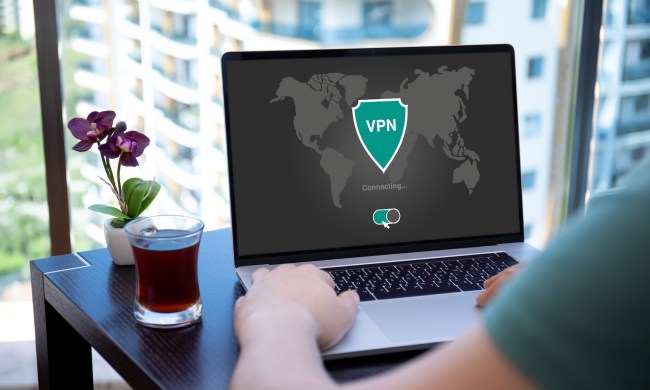VPN and VPS may be very similar-sounding terms but they’re actually very different things in the world of technology. A Virtual Private Network allows you to remain anonymous and private while using the internet, while a Virtual Private Server is a form of web hosting.
Still confused? Don’t worry. Read on and we’ll tell you all about the key differences between the two, as well as break down exactly what each form of technology is.
What is a VPN?
A VPN is a way in which you can create a bridge between you and the internet. By doing so, your data is encrypted and kept completely private so that your ISP or the websites you’re browsing don’t know what you’re doing. Instead, the VPN keeps your data private so there’s no way of other sources accessing it. Consider it an extra layer of security between you and the outside world, ensuring your work or personal life is kept more private as you browse.
VPNs are very useful for multiple purposes so it’s important to know exactly what a VPN is and how it can help you in your daily life. In particular, if you use many public Wi-Fi networks, it’s extra important to have a VPN service available to you, as you can’t trust the safety of a public network. Even smartphones benefit from a VPN.
What is a VPS?
A VPS is a form of web hosting. It’s useful to know the different options for web hosting to see where a VPS fits in. At the cheaper end of web hosting is shared server hosting. As the name suggests, your website is hosted on the same server as many other websites meaning it’s cheap but speeds can be slower and you have less control over the inner workings of your site because you don’t have full server access.
More expensive is dedicated server hosting in which you get a whole server just for your website. The problem here is that it can be overkill for many users and it costs a lot. You do get more customization options, however.
In the middle is VPS hosting. It’s a hybrid of a shared and dedicated server. It still works for multiple users at once but it keeps them separate on their own virtual server. That way, you get better speeds and more customization options without having to pay as much as you would for a dedicated server.
Related to that are cloud VPS servers which spread the information and virtual servers across a cloud-based network of physical servers. These tend to be slightly less secure but much cheaper, and often with lower downtime than regular VPS systems.
Why do I need a VPN?
A VPN keeps your internet browsing history secure. It encrypts your web traffic so that anything you’re doing is protected from hackers and other nefarious users. By providing you with enhanced security, you’re safer when connected to a public Wi-Fi network. However, it also protects your privacy on your regular home network too.
That’s because ISPs and online advertisers can collect data about your browsing habits as you use the internet. A VPN allows you to hide your activity and your IP address meaning you’re entirely anonymous.
In addition to that, you can use a VPN to avoid georestrictions meaning you can browse otherwise censored websites or simply use streaming services not available in your country.
It’s also possible to even gain cheaper prices on certain products by using a VPN. Some retailers such as airlines and hotel companies use your browsing history to offer you more expensive prices. With your history disguised by a VPN, you’re given the cheapest price every time.
There’s also the advantage of no bandwidth limitations. While many ISPs may limit your browsing speeds after excessive use, using a VPN means they can’t track what you’re doing. ISPs are prone to limiting download speeds when torrenting, so this is particularly useful if you download many files regularly.
Why do I need a VPS?
A VPS is nothing like a VPN because it’s aimed at those who want to host their own website. A VPS is a form of dedicated server for your web hosting or storage needs, with files stored on a virtual server rather than a dedicated physical server which is a much more expensive alternative.
A VPS is a much more cost-effective manner of hosting your website than using dedicated hosting. You share the server with other users while still having full control of your virtual server contained within. For growing web presences, it has the benefit of scalability allowing you to add more disk space, RAM, or other hardware as needed.
While a shared hosting plan can be quite slow and limited, a VPS means your website can handle a sudden spike in traffic. It also gives you the flexibility of controlling and customizing your server, adding extra software or hardware for a price.
VPS server hosting is best if you plan to run complex applications, set up eCommerce platforms, or even run remotely operated software.
Because of that, VPS hosting typically needs some level of technical knowledge to get the most from it. Many website owners will be fine with a shared hosting plan but once they get to grips with more technical details, a VPS is a good middle ground before considering a much more expensive dedicated server.
How much do a VPN and VPS cost?
VPNs are available from a number of different sources. It’s important to check out the best VPN for your needs with many services available quite cheaply.
In comparison, a VPS can be more expensive as it’s a more specialist service. Not everyone needs a VPS. Only those planning on hosting a website need to consider it. Even then, many users will be fine with a shared hosting plan instead.
If you have a growing business though, a VPS can be a very useful way of gaining the flexibility of a dedicated server for less. As with a VPN, make sure to do your research and plan ahead for what you need most from your web hosting.
VPN vs. VPS: A big difference
The acronyms might sound similar but there are big differences between what VPN and VPS mean.
To narrow things down, a VPN is something that most users need. Able to keep your data secure, whether from the prying eyes of your ISP at home or the risk of a potentially nefarious source when using a public Wi-Fi network, a VPN is an essential tool these days. It’s always best to keep your browsing private and secure, and a VPN is an inexpensive way to do that.
For those launching a business or other endeavor via a website, a VPS can be useful. It’s a more advanced form of web hosting so it won’t suit everyone, however, it has many strengths. Its best purpose is to allow you to scale your website in line with your business growth, giving you more freedom over using regular shared hosting. It’s not essential for every web user, but for the tech-savvy website owner, it’s a good option to consider.
Don’t expect it to keep your browsing history private as a VPN would. These are very different tools!



